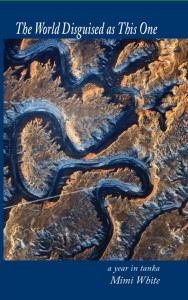The World Disguised as This One
a year in tanka by Mimi White
ISBN: 978-0-9904287-6-3
5.5 x 8.5 87 pages; $16.95
temporarily out of stock
Individuals can order at the link below
this title is available from spdbooks.org
Praise for The World Disguised as This One
This beautifully observed, penetrating collection of tanka slips itself into and under awareness. A narrative holding equally an illness’s navigation and the abiding, altering beauty of existence, each five-line poem is complete in itself, a world presented in full. Yet in reading these pages through, their accumulation leads to a shifted landscape of being. As life itself does.
—Jane Hirshfield
The World Disguised as This One by Mimi White, Reviewed by Laura Maffei
In her tanka collection The World Disguised as This One, Mimi White writes with an exquisite sense of diction and rhythm, choosing and placing every word the way a painter chooses each hue and places every brushstroke. This results in poems that are quiet yet forceful, delicately precise yet immensely powerful. With the sure hand of a master, Mimi White is able to make her tanka do what the form does best: say in an evocative, visceral way what is not being said, as in, Since news/of your illness/the ground/has been too hard/to plant tulips (15).
Arranged in a sequence of the four seasons, the collection takes us through a year in the life of a fellow human being with whom the reader shares universal experiences. Winter: silence, solitude, hunger. In spring: longing, change, hope. Summer: movement, energy. In autumn: nostalgia, anticipation. The poems are often layered with a clear physical indicator for their season as well as the corresponding emotional theme, subtly expressed, as in, I did not see/the white-tailed deer until/they ran high-stepping/through the new grasses—why just a glimpse, I cried (spring, 37), and Whatever thermals/the red-tailed hawk climbs/I want to ride—/trees roads tinier/as if drawn by schoolchildren (autumn, 72).
White excels at the observational tanka as well as the pointed, questioning ones. This energetically drawn observation of a mallard is as vivid as they come: A mallard gobbles/one snail then another/shell muscled nub/of a body down the gullet/till it seems he will burst (51). This poem, with its simply stated question joined to its simple but powerful image, brings us to the same universal porch: What of our selves/do old friends bring/to our porch/midsummer/the sky darkening (55).
The collection is a wise and acutely-observed work about the human being in time, in nature, and in the self. Mimi White’s deftness with the tanka form and clear-sightedness about the human condition make The World Disguised as This One a gratifying read.
—Laura Maffei, editor of American Tanka and the author of Drops from Her Umbrella.
Other information about the author
Publisher’s note
Mimi White explores new forms with her sensitive poetic reach in language and vision, often mixing the natural world and the human condition together to express the mysteries of life as a sense of those things that cannot be seen.
From the back cover:
One of the oldest Japanese forms, the tanka (or waka) originated in seventh-century Japan. Perhaps less well known to Western audiences than the haiku, it predates this form by several hundred years. The tanka usually contains thirty-one syllables or sound units, nearly double the haiku’s seventeen. Like the haiku, the tanka’s central image is taken from nature, but a shift almost always occurs when that image is recast through a more personal lens. As Yoel Hoffman writes in his introduction to Japanese Death Poems, “The tanka poet may be likened to a person holding two mirrors in his hands, one reflecting a scene from nature, the other reflecting himself as he holds the first mirror.”
Praise for “Memory Won’t Save Me, a haibun”:
When the Japanese poet-monk Basho invented the haibun, the alternating haiku and prose in which he documented his travels, he certainly never imagined what a poet could do with the form in twenty-first century American English. Mimi White’s “Memory Won’t Save Me” is an ingenious, fascinating appropriation, an account of both physical and emotional travel.
—Chase Twichell

